Friday Feb 06, 2026
Friday Feb 06, 2026
Tuesday, 26 July 2016 00:01 - - {{hitsCtrl.values.hits}}
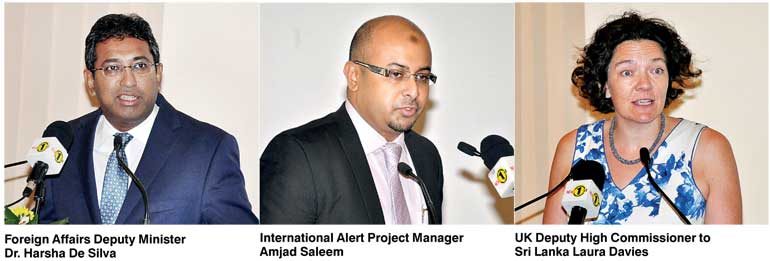
By Dharisha Bastians
International Alert, a London-based conflict prevention NGO, last week released the report ‘Roadmap for Engagement with Overseas Sri Lankans,’ aimed at guiding policymakers and the private sector to find meaningful ways to engage Sri Lankan communities and individuals residing in other countries.
At the outset, the report’s drafters said they struggled with the terminology to define overseas residents of Sri Lankan origin in their observations and recommendations in the report, since the term most widely-used to describe these communities – ‘diaspora’ – has been heavily misused and abused in polarising political debate in the island.
“What do you call them?” Dayani Panagoda, a member of the report’s working group and panellist at the report launch, said. “We deliberated a lot on that. ‘Diaspora’ has such a negative connotation now,” she said.
International Alert recommended a change in this terminology, to better reflect the diversity of Sri Lankan diaspora, with the terms Overseas Sri Lankans or People of Sri Lanka Origin Overseas.
International Alert is urging the Government and policy makers to attract investment and tap into the skills and knowledge potential of Sri Lankan communities overseas.
Sri Lanka has one of South Asia’s largest diaspora-to population ratios, with three million, or up to 14% of the island’s current population living overseas.
The relatively high numbers of people of Sri Lankan origin living overseas, International Alert said was a product of different waves of migration attributed to post-colonial developments, economic prospects, political instability as a result of insurrections and a 30-year civil war and education opportunities.
“As such, the Sri Lankan diaspora is by nature not considered to be homogenous as it represents the many social, political, ethnic and religious ideologies and experiences that exist in Sri Lanka,” the International Alert report notes.
International Alert in its report said Sri Lankans could play a big role in social and economic development and skills and knowledge transfer.
“The diaspora has the ability to enhance and build relations that can either positively or negatively impact on their country of origin,” the report said. “They also have the potential to play a significant role in peace-building, reconciliation and recovery.”
In order to be constructively engaged, communities of Sri Lankans living overseas need to be understood by the local community as well as the Sri Lankan Government, which must acknowledge them as a formal stakeholder, the report recommended.
The report was a five-year collaboration between the British High Commission in Colombo and International Alert, UK Deputy High Commissioner to Sri Lanka, Laura Davies said at the launch. She told the audience at the Kadirgamar Institute last Wednesday (13) that the report’s recommendations were ‘credibility tested’ and provides ideas for the Government to take forward.
Sri Lanka needed to understand and acknowledge the diaspora as a legitimate constituency, Davies said.
The most important thing was to “keep the conversation going,” she added.
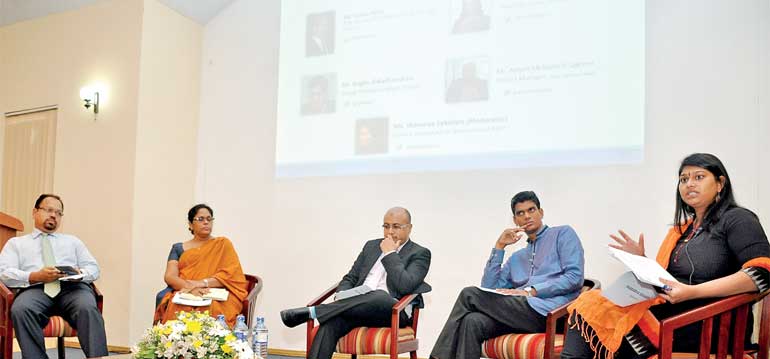 From left: Advisor to the Ministry of Foreign Affairs and former Chairman of the Resettlement Authority Harim Pieris, Raghu Balachandran, of the Young Political Leaders Forum (YPLF), a member of the report’s working group DayaniPanagoda, International Alert Project Manager AmjadSaleem and panel discussion moderated by International Alert Project former Consultant Sharanya Sekaram
From left: Advisor to the Ministry of Foreign Affairs and former Chairman of the Resettlement Authority Harim Pieris, Raghu Balachandran, of the Young Political Leaders Forum (YPLF), a member of the report’s working group DayaniPanagoda, International Alert Project Manager AmjadSaleem and panel discussion moderated by International Alert Project former Consultant Sharanya Sekaram
Deputy Minister of Foreign Affairs Dr. Harsha De Silva who was the keynote speaker at the event said the Ministry was reaching out to overseas Sri Lankans who have potential to help with reconciliation and investment.
“These are people who are no longer Sri Lankan citizens but continue to maintain effective ties to the country. They have an emotional need to contribute,” the Deputy Minister said, explaining that many overseas Lankans who met him had what he called the ‘I must help’ feeling.
“We invite overseas Sri Lankans to invest in Sri Lanka, start businesses and share knowledge,” Dr. De Silva said during his address. He said overseas Sri Lankans were uniquely placed to dispel myths about the island in their countries of residence. Dr De Silva referred to recommendations in the Lessons Learnt and Reconciliation Report released in 2011, which observed that some diaspora groups sought to engage constructively. “The LLRC said the Government should constructively engage with these groups, since hostile diaspora groups could potentially undermine reconciliation in Sri Lanka,” Dr. De Silva recalled from the commission’s report.
According to the Deputy Foreign Affairs Minister, the Ministry of Foreign Affairs were taking several practical steps to build constructive engagement with overseas Sri Lankans. Sri Lankan missions abroad have already started reaching out to Sri Lankan communities, after what he called “years of mistrust and bitterness.”
The Ministry has created a special Division for Overseas Sri Lankans and was hoping to organise a Diaspora Festival in the next year, Dr. De Silva explained. “The festival will enable Sri Lanka to benefit from the capacity, skills and knowledge of its overseas Sri Lankans and hopefully they will realise Sri Lanka was welcoming them back,” the Deputy Minister noted.
Dr. De Silva said that in the Government’s interactions they found that many Sri Lankans living overseas had claimed they faced practical challenges to returning home and engaging constructively in the island, with visas and their interactions with local authorities.
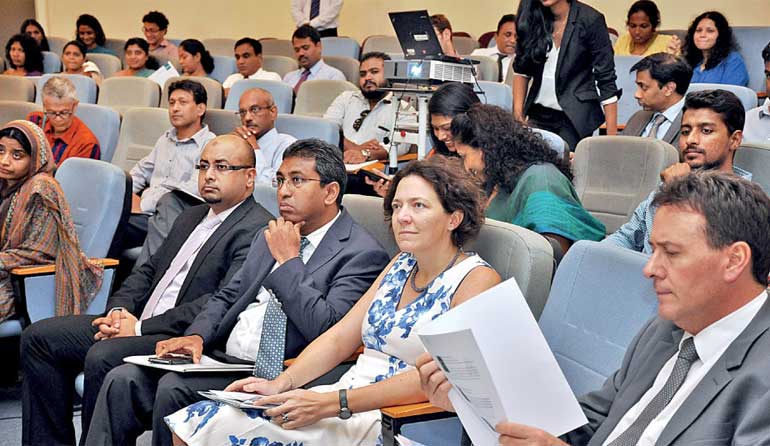
During the panel discussion held at the launch, Advisor to the Ministry of Foreign Affairs and former Chairman of the Resettlement Authority Harim Pieris explained that there were three major conflicts impacting the engagement with the diaspora. The first he said was the conflict between the LTTE and the Sri Lankan armed forces. The second, Peiris said was the conflict between the two major political parties – the SLFP and the UNP. The third, was the conflict between Sinhalese nationalism and Tamil nationalism.
Of these, Peiris noted, two conflicts were now effectively ended with the closure of the military conflict in 2009 and the decision of the two main political parties to govern together in coalition since 2015. “This has created a space and opportunity we have never had before – there is a new dynamic here,” Peiris noted, explaining that it was an opportune moment to engage with the diaspora.
“It is the first time in 20 years that the centre has been as moderate as it is now. In the North the LTTE has been replaced by the TNA and as for Sinhala nationalism, it has gone from control of the presidency to being relegated to an opposition formation of about 50 MPs,” he said.
The message to the diaspora, Peiris said, was that this was an opportunity to be grasped.
He noted that in its engagement, overseas Sri Lankans have focused mostly on the accountability process, while the political and humanitarian processes have been largely neglected. “There is a need to balance this out,” Peiris said.
He underlined the importance of factoring in what he called the ‘third stakeholder’ in the engagement process, the Muslim Community. “This is a success critical factor, because in the merger discussions for instance, dialogue with the Muslim community is crucial,” Peiris said while congratulating the Tamil National Alliance for reaching out to the Muslim community in the north and east.
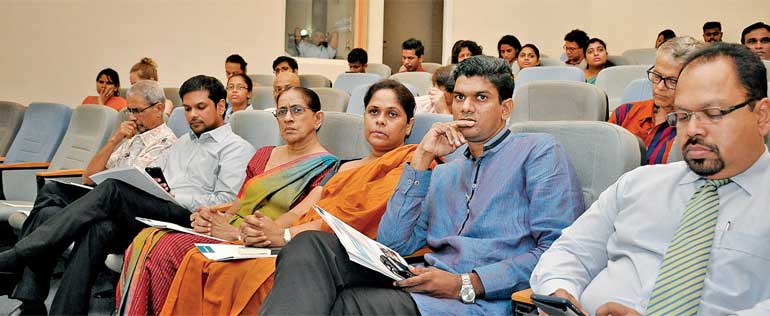
Raghu Balachandran, of the Young Political Leaders Forum (YPLF) who currently serves as media secretary to the Leader of the Opposition, R. Sampanthan, said a group of young political representatives had sought to engage the diaspora communities in the UK in 2011.The group included MPs Harim Peiris, Niroshan Perera, Wasantha Senanayake and others, including Balachandran himself.
Initially, the overseas Sri Lankans were not receptive to the discussions, Balachandran recalled. “The claim they made initially was that we were in this discussion to somehow try and neutralise their engagement with the Human Rights Council,” said Balachandran, who also served on the International Alert working group on the report. By the second and third meetings, they were much more willing to listen. “This was because we allowed them to speak freely, we didn’t attack them or make counter arguments,” he said.
“They badly want to be heard,” Balachandran explained, saying the diaspora representatives began to trust them with time and constant rapport has continued with them. The cross party group of young parliamentarians had prepared recommendations to the Government on the basis of their discussions with diaspora groups, he said.
The recommendations included changing Victory Day to a day of remembrance. “When you celebrate a victory day, it implies that someone was defeated,” Balachandran explained, saying that this seemed important to the overseas communities. The recommendations also included a separate desk at the Ministry of Foreign Affairs for diaspora Sri Lankans and for missing people cases to be opened and cleared.
International Alert Project Manager Amjad Saleem said the Roadmap was a ‘living document’ and does not stand alone, but is a place to begin a conversation about re-engaging with Sri Lankans living overseas.
To begin with, it was important to understand who the diaspora is, Saleem noted. “They are ethnically, socially and generationally diverse and they want is acknowledged that not all the groups are about destroying the country,” he said.
“From the International Alert perspective, this is not a document to end all documents. It’s a place to start a conversation and is targeted at policy-makers, Sri Lankan missions overseas and Overseas Sri Lankans,” Saleem said, explaining the IA report.
He also stressed that the diaspora faced its own political conundrums, but it was not useful for Sri Lankans living overseas to adopt harder positions than elected representatives in Sri Lanka. “One of the greatest cases for moderate positions in the diaspora is the moderate stance of the Tamil National Alliance,” Saleem noted.
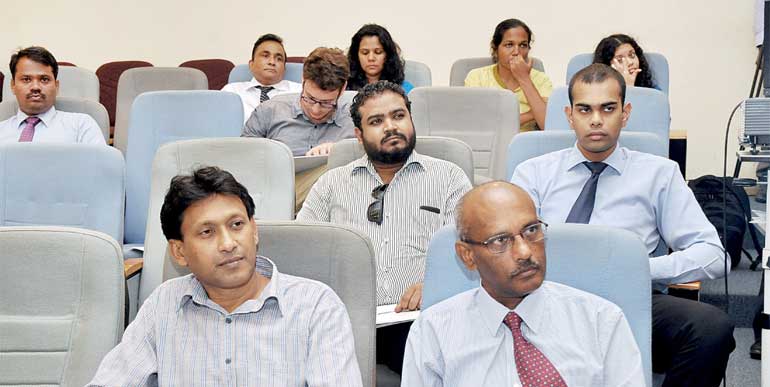
Dayani Panagoda, a member of the report’s working group, explained the challenges of capturing perspectives after their discussions with diverse age and social groups. Panagoda stressed that legal frameworks must be put in place for cooperation with overseas Sri Lankans. She said policy has been made over and over again, but implementation has been more difficult. “We must decide, are we truly being inviting and inclusive? What is the vision for this country’s future – we need to work together with the Ministry of Foreign Affairs on that,” Panagoda said.
Sri Lanka, Panagoda said, had been given a blank canvas, after the end of the war and the democratic transition in 2015. “Can we paint it with a Sri Lankan-ness?” she asked.